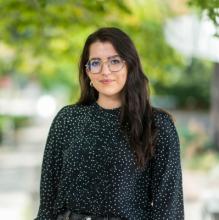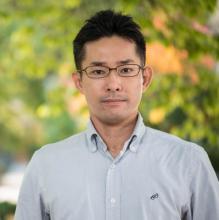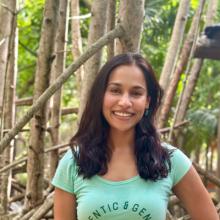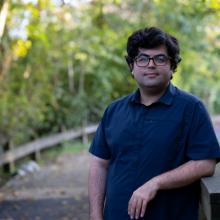My research explores the complex intersections of urban infrastructure and migration in Istanbul, that currently hosts more than half a million refugees, mostly from war-torn Syria. Since 2011, the immense volume of international migrants moving into Turkey, has inevitably, had serious implications for the recipient cities and migrants. I investigate how the existing (and/or those in the making) infrastructures, such as the construction sector, waste management, and basic services like transportation are influenced by the presence of migrants; and how migrant communities act upon, experience, and adapt to these infrastructures that determine their movement.
Research Description
My research explores the complex intersections of urban infrastructure and migration in Istanbul, that currently hosts more than half a million refugees, mostly from war-torn Syria. Since 2011, the immense volume of international migrants moving into Turkey, has inevitably, had serious implications for the recipient cities and migrants. I investigate how the existing (and/or those in the making) infrastructures, such as the construction sector, waste management, and basic services like transportation are influenced by the presence of migrants; and how migrant communities act upon, experience, and adapt to these infrastructures that determine their movement. I will document in what ways these arrangements (re)organize mobility and categories of entitlement, citizenship and sovereignty. How are infrastructures entangled with the socioeconomic vulnerabilities of those seeking refuge? Istanbul, in this regard, stands out as a remarkable case.
What does being a Public Scholar mean to you?
To me, being a public scholar means bridging the gap between academia and public institutions while investing in knowledge that will inspire people to become key allies for vulnerable groups such as refugees. It is crucial to actively engage and collaborate with our research subjects and seek various means to reciprocate while we benefit from their insights. As such, making the outcomes of our research comprehensible and easily accessible is critical, for it will allow community members to express their opinions and provide a sense of shared authority over knowledge production.
In what ways do you think the PhD experience can be re-imagined with the Public Scholars Initiative?
I aim to challenge the traditional hierarchies between academics and research subjects and become a public scholar to provide a more nuanced understanding of migrant lives in Istanbul. To this end, having the support of PSI is unmatched, as it provides the necessary platform to engage in conversations with key actors and ensure that my project can also have a meaningful purpose for the subjects of my research. Joining PSI’s strong network of scholars expands my access to the essential resources and training in producing knowledge that will have a positive impact on migrant communities. Mobilizing research partners across the world, PSI also offers useful guidance to become an influential leader who safeguards interests of marginalized communities in Turkey.
How do you envision connecting your PhD work with broader career possibilities?
Upon completion of my doctoral degree, I hope to expand my expertise in Istanbul to other migrant-receiving cities in Turkey. My research project can potentially inform decision-making processes about migration management and provide guidance to many other urban centers that are transformed by migrant presence. I can easily envision this research to become part of a larger-scale postdoctoral research project that investigates country-wide infrastructural development in relation to influx of migrants. I will continue collaborating with public institutions and researchers to develop projects that will benefit migrants and refugees from a distinct anthropological approach.
How does your research engage with the larger community and social partners?
I feel very grateful for collaborating with Mülteciler Derneği, Turkey’s largest non-profit organization that assists refugees and provides additional expertise to their founder, Sultanbeyli Municipality, on strategies of capacity-building and safety in sectors such as construction and waste management. I plan to consult with Turkish government officials on the accessibility of basic services for refugees, and I will present my findings in municipal councils. Public institutions in Istanbul could make use of the anthropological perspective I have to offer; I can shed light on migrants’ interactions with systems of provision and processes of urban development from a unique and ethical standpoint.
Why did you decide to pursue a graduate degree?
Inspired by the transformative potential of anthropology to bring scholarship to bear on pressing questions of our times, I decided to pursue a PhD in Anthropology at UBC. As a public scholar, I feel fortunate that this discipline provides me with an observer’s perspective on everyday experiences, welcomes filmmaking as a means of storytelling and expanding the reach of anthropological research while also holding the possibility of contributing to social change.
Why did you choose to come to British Columbia and study at UBC?
The PhD program in Sociocultural Anthropology at UBC has been an excellent match to carry out my research project. Home to the second oldest anthropology program in Canada, the department has an outstanding faculty with leading scholars in the fields of urban anthropology, political anthropology and migration. I work under Professor Alexia Bloch whose research on transnational migration and mobility which involves ethnographic fieldwork in Istanbul and post-Soviet localities, has been. providing me with key mentorship. It is a remarkable opportunity for me to be supervised by a scholar who has substantial knowledge of my hometown. UBC Migration Research Cluster also offers remarkable resources by gathering researchers to focus on challenges and opportunities of immigration in an interdisciplinary environment.
Being a public scholar means bridging the gap between academia and public institutions while investing in knowledge that will inspire people to become key allies for vulnerable groups such as refugees. It is crucial to actively engage and collaborate with our research subjects and seek various means to reciprocate while we benefit from their insights.




